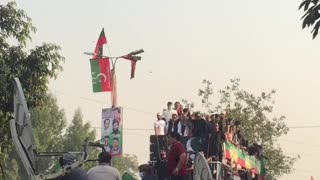Imran Khan
Imran Khan, born on October 5, 1952, in Lahore, Pakistan, started his journey as a cricketer. He emerged as one of the finest all-rounders in the history of the sport. Khan played a crucial role in Pakistan's historic Cricket World Cup victory in 1992, captaining the team to success.
Beyond cricket, Imran Khan transitioned into politics, founding the political party Pakistan Tehreek-e-Insaf (PTI) in 1996. Initially, he faced challenges and struggled to gain significant political traction. However, his perseverance and commitment to anti-corruption and social justice resonated with many Pakistanis.
Over the years, Imran Khan's PTI gained momentum, especially among the youth. In the 2018 general elections, PTI secured a substantial victory, and Imran Khan became the 22nd Prime Minister of Pakistan. His leadership style has often been characterized by a focus on economic reforms, anti-corruption initiatives, and social welfare programs.
As Prime Minister, Khan faced various challenges, including economic issues, political opposition, and regional tensions. His efforts to address corruption and improve governance have been central to his agenda. The success and impact of his policies have been subjects of both support and criticism.
Imran Khan's journey from a cricket legend to a political leader reflects his multifaceted career and the evolving landscape of Pakistani politics. His tenure as Prime Minister has been marked by a mix of achievements and ongoing challenges, shaping his legacy in the complex realm of South Asian politics.
-
 0:49
0:49
Hudakhalid
1 year agoImran khan
16 -
 0:51
0:51
George Galloway
4 months agoImran Khan do it
1.92K5 -
 0:17
0:17
Taabi0076
1 year agoImran Khan Great leader ✌🏼
3 -
 1:03:54
1:03:54
KnowMoreKnowledge
1 year agoعمران خان پاکستان اور عالمی سیاسی منظر نامہ - Imran Khan: The Global Political Situation in Pakistan
1 -
 1:01
1:01
Mr
8 months agoIMRAN KHAN THE BEST LEADER
3 -
 15:31
15:31
hassanzaman
10 months agoImran Khan - A "living God" (1992) | 60 Minutes Australia
8 -
 0:28
0:28
snapvids
10 months agoImran Khan Entry
22 -
 0:22
0:22
Faizanshannor
1 year agoIMRAN khan
2 -
 0:35
0:35
hubetabibi
9 months agoImran Khan: Beloved Leader
-
 0:21
0:21
ali4683
1 year agoKing OF Pakistan Imtan Khan
3